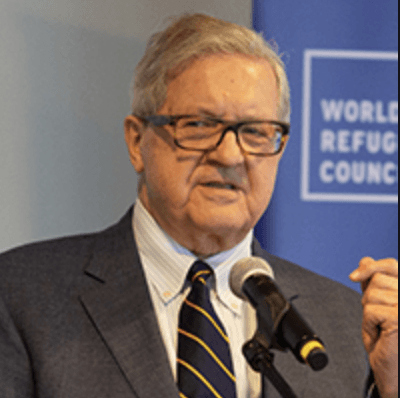This article was originally published in The Globe & Mail.
As Russian atrocities in Ukraine compound, the debate over how to hold Russian President Vladimir Putin and his accomplices accountable for their crimes is mounting amongst international-law experts and government policy makers.
Missing from that discourse is a recognition of a striking irony: Our modern concept of international criminal law derives largely from the work of two lawyers from Lviv, Ukraine. Hersch Lauterpacht and Raphael Lemkin are the originators of the concepts of crimes against humanity and genocide, which have influenced the creation of tribunals and courts in which prosecution for these international crimes can take place.
This important history – so relevant today – is brilliantly recounted in the 2016 book East West Street by Philippe Sands, an international human-rights lawyer who was involved in the celebrated prosecution of Augusto Pinochet, former president of Chile, and other cases before the International Criminal Court (ICC).
Mr. Sands describes the unique circumstances in which Lauterpacht and Lemkin, both born at the turn of the 20th century, lived on the same street in Lwow (Lviv), attended the same law school with the same professor and were both forced to flee their city because of rising antisemitism in the 1930s. They subsequently became instrumental in laying the foundation for our present-day commitment to international justice for political and military leaders who willfully commit violence against civilians.
Strangely, the two never met and came to see each other as competitors. Lauterpacht went on to become a professor of law at Cambridge University and became the intellectual force behind the Nuremberg war-crimes trials. His work brought forth a new emphasis on using international judicial standards to prosecute crimes against individuals perpetrated by the state.
Meanwhile, Lemkin found sanctuary at Duke University, where he compiled a record of the crimes committed during the Holocaust and coined the term “genocide” to describe these types of crimes against humanity. His concept didn’t have much traction at Nuremberg, but it did lead to a successful campaign to have the United Nations General Assembly adopt the Genocide Convention.
The principles advocated by these two remarkable men crystallized the idea that sovereignty does not confer on the state absolute authority; state power must be constrained by international standards of human rights.
If there ever was a time and place to invoke this fundamental assertion arising from the work of Lauterpacht and Lemkin, it is in present-day Ukraine. As Mr. Putin continues to condone the massacre of civilians, the international community can look to the rules-based limitation on the uncontrolled exercise of his power provided to us by two Ukrainian-born legal scholars and activists.
And make no mistake: It can work. During the Kosovo crisis in 1999, former Supreme Court of Canada justice Louise Arbour – then-prosecutor for the International Criminal Tribunal for the former Yugoslavia – indicted Slobodan Milosevic and four of his cronies. At the time, I was part of a foreign-ministers group trying to arrange a settlement of the conflict.
Mr. Milosevic was initially defiant. But after his indictment as a war criminal, his tone changed; he lost support domestically and was ready to talk. We then quickly organized a Security Council resolution that resulted in an end to the conflict and in Mr. Milosevic going to The Hague to stand trial. The episode proved that shaming and prosecuting are effective tools in slowing the swagger and diminishing the hold of autocrats.
In the present crisis, there has to be an end to dithering and half measures. The U.S. must be persuaded to move beyond the rhetoric of war crimes and into unconditional support for the ICC to quickly proceed toward the indictment of Mr. Putin and his generals. Canada, which played an instrumental role in the creation of the ICC, must put its diplomatic convening skills to work to mobilize a coalition in support of the jurisdiction of the court. There is more to be done than relying on further sanctions. The time is long past due to put the power of law to work.
In 2019, I visited East West Street in Lviv to pay homage to the contribution of Lauterpacht and Lemkin to justice and peace. Through their brave and principled work, they created a framework for accountability for international crimes and issued a call to the conscience of humankind. Amid the rubble and the ruins created by Russia’s lawless war, it is surely time for us all to heed their call.

